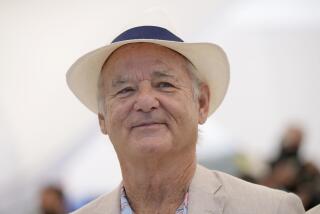Key question in Jackson trial: who employed Dr. Conrad Murray
The central question in the Michael Jackson wrongful-death trial is who employed Dr. Conrad Murray: Jackson or concert promoter AEG.
In testimony that appeared to undercut AEGâs claims that the doctor worked for Jackson, a company executive said Thursday that negotiations over Murrayâs $150,000-a-month contract did not include the singer or his advisors. He also said that the performerâs camp never saw the drafts of the agreement.
The admission by Shawn Trell, AEG Liveâs senior vice president and general counsel, appeared to help the Jackson family members who insist the company negligently hired and supervised Murray, now serving time for involuntary manslaughter after giving the singer a fatal dose of the anesthetic propofol.
AEG maintains that Jackson hired Murray and that his salary was part of an advance made to the singer for his âThis Is Itâ tour to be held at the 02 Arena in London. The day before Jackson died, Murray signed a contract with AEG, but the agreement was never signed by the company or Jackson.
The case brought by Jacksonâs mother and three children against Anschutz Entertainment Group has so far largely been built on emails that portray AEG executives as brash, callous business people who dismissed the pop starâs erratic behavior and emaciated frame and were concerned only with potential profits.
In one example, Ted Fikre, AEGâs chief legal and development officer, called Jackson âthe freakâ in an email to Trell.
According to an email shown to jurors Thursday, the production manager for Jacksonâs planned comeback concerts told an AEG executive that he had watched the performer deteriorate physically and mentally over the previous eight weeks.
John âBugzeeâ Hougdahl sent the message to AEG Live President and Chief Executive Randy Phillips six days before Jackson died, noting that the performer was in need of a physical trainer and âa shrink to get him mentally prepared.â
âHe was able to do multiple 360 spins back in April,â Hougdahl wrote. âHeâd fall on his ass if he tried it now.â
Emails concerning Murray have been shown repeatedly since the trial began four weeks ago and could end up being crucial to jurors.
âWe want to remind him that it is AEG, not MJ who is paying his salary,â AEG executive Paul Gongaware wrote June 14, 2009, to the tourâs director, Kenny Ortega, about a planned meeting with Murray. âWe want him to understand what is expected of him.â
Less than a week later, Ortega emailed Phillips that Jackson was exhibiting signs of paranoia, anxiety and obsessive-like behavior. Ortega suggested bringing in a psychiatrist.
âItâs like there are two people in there,â Ortega wrote. âOne (deep inside) trying to hold on to what he was and still can be and not wanting us to quit him, the other is in this weakened and troubled state.â
Phillips replied, âI had a lengthy conversation with Dr. Murray, who I am gaining immense respect for as I get to deal with him more. He said that Michael is not only physically equipped to perform and, that discouraging him to, will hasten his decline. ⌠This doctor is extremely successful (we check everyone out) and does not need this gig so he [is] totally unbiased and ethical.â
The Jacksonsâ attorney, Brian Panish, took aim Thursday at AEGâs contention that Jackson was ultimately paying Murray.
âYou could have said, âMr. Jackson, we believe something as personal as hiring a doctor, you should hire your own doctor with your own money,ââ Panish said to Trell.
âYes,â the AEG attorney replied.
Panish asked him what stopped the firm from telling Jackson to negotiate a deal with Murray and then advance the singer the money, as it had for production costs and to pay the rent on his mansion.
âNothing,â Trell replied.
Trell, who was on the witness stand for four days, said the company never looked into Murrayâs background because he was an independent contractor. After Jacksonâs death on June 25, 2009, investigators discovered Murray owed hundreds of thousands of dollars in tax liens, child support and other debts.
Attorneys for the Jacksons have argued that the doctorâs situation motivated him to push Jackson to perform.
âDo you believe the thought of losing $150,000 a month would put pressure on anyone?â Panish asked Trell.
âI canât speak to that,â Trell replied.
AEG attorney Marvin Putnam was dismissive of the plaintiffsâ case, saying much of the evidence did not deal with the relevant issues but was introduced to inflame the jury. âIf you canât put on a case, put on a show,â Putnam said.
More to Read
Sign up for Essential California
The most important California stories and recommendations in your inbox every morning.
You may occasionally receive promotional content from the Los Angeles Times.












